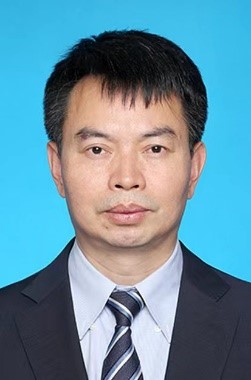

Title: Key Technologies and Exploration of Intelligent High-Mobility Ground Platforms
Panelist: Hui Liu
Abstract: High-mobility ground platforms that can perform tasks such as assault battles, reconnaissance patrols, and engineering operations, are widely used in military operations, emergency rescue, construction machinery, airport terminals and other fields. Such platforms are of great importance for the national security and economic construction. This report focuses on the electrification and intelligent technology of high-mobility ground platforms, including the research statues, development trends, key issues, and technological exploration and prospects. Particularly, the core capabilities and key issues of intelligent high-mobility ground platforms, and relevant researches and the technical exploration conducted by the rapporteur team in this field are highlighted.
 Personal Profile:Prof. Hui Liu received a PhD degree of Vehicle Engineering in Beijing Institute of Technology (BIT) in 2003. Her research interests are vehicle dynamics and control. She won the title of Changjiang Scholars and was approved the Outstanding Young Talent Fund by the Ministry of Science and Technology in 2020. She serves as the vice director of the Multi-modal Intelligent Robot and System integrated research platform of the Ministry of Education, the member of the Department of Mechanical and Transportation of BIT, and the director of the Department of Vehicle Engineering of BIT. Prof. Liu is the member of the Off-Road Vehicle Technology Branch of the China Society of Automotive Engineering, the Armed Police Force General Vehicle Equipment Technology Application Expert Advisory Group, and the Mechanical Design Branch of the Chinese Society of Mechanical Engineering. She is also the executive editor of the special issue of Acta Armamentarii and the guest editor of the special issue of Automotive Innovation. She presided over several scientific research projects such as key projects of the National Natural Science Foundation of China, major national defense background pre-research projects, and national defense basic product innovation plan projects. More than 140 published academic papers have been included in SCI and EI, and more than 20 national and national defense invention patents have been authorized. She has won one first prize of the National Technological Invention Award and two first prizes of the National Defense Science and Technology Progress Award.
Personal Profile:Prof. Hui Liu received a PhD degree of Vehicle Engineering in Beijing Institute of Technology (BIT) in 2003. Her research interests are vehicle dynamics and control. She won the title of Changjiang Scholars and was approved the Outstanding Young Talent Fund by the Ministry of Science and Technology in 2020. She serves as the vice director of the Multi-modal Intelligent Robot and System integrated research platform of the Ministry of Education, the member of the Department of Mechanical and Transportation of BIT, and the director of the Department of Vehicle Engineering of BIT. Prof. Liu is the member of the Off-Road Vehicle Technology Branch of the China Society of Automotive Engineering, the Armed Police Force General Vehicle Equipment Technology Application Expert Advisory Group, and the Mechanical Design Branch of the Chinese Society of Mechanical Engineering. She is also the executive editor of the special issue of Acta Armamentarii and the guest editor of the special issue of Automotive Innovation. She presided over several scientific research projects such as key projects of the National Natural Science Foundation of China, major national defense background pre-research projects, and national defense basic product innovation plan projects. More than 140 published academic papers have been included in SCI and EI, and more than 20 national and national defense invention patents have been authorized. She has won one first prize of the National Technological Invention Award and two first prizes of the National Defense Science and Technology Progress Award.
****************************************************************************************************************************************************************
Title: Human-Like Decision Making and Control Technologies for Autonomous Vehicles
Panelist: Jianqiang Wang
Abstract: Autonomous vehicles can bring a “safe, comfortable, energy-saving, and efficient” driving experience, with functions such as environmental perception, intelligent decision-making, and collaborative control. Driven by the technological changes of big data and artificial intelligence, the coupling relationship between autonomous vehicles and traffic participants in complex environments has gradually evolved, and more intelligent decision-making and control technologies are urgently needed to realize the safe and efficient autonomous driving. This report first introduces the development status and technical challenges of autonomous vehicles, and analyzes the core issues of its decision-making and control technologies. Then focus on the research development and typical application of human-like intelligent decision-making and multi-objective collaborative control technologies for autonomous vehicles in dynamic traffic, aiming to improve the safety and reliability of vehicle decision-making and control. Through in-depth discussion of the future development trend of human-like decision and control technology, and hopefully promote the process of vehicle intelligence.
 Personal Profile:Jianqiang Wang received his B.Tech. and M.S. degrees in Automotive Application Engineering from Jilin University of Technology, Jilin, China, in 1994 and 1997, respectively, and received his Ph.D. degree in Vehicle Application Engineering from Jilin University, Jilin, China, in 2002.He is currently a Professor at the School of Vehicle and Mobility, Tsinghua University, Beijing, China. He has authored and co-authored more than 160 journal and conference papers. He is also the co-inventor of more than 100 patents. His research interests include intelligent vehicles, intelligent safety of vehicles, V2V/V2I, and driver modeling. Prof. Wang has been involved in more than 20 sponsored projects and has received more than 10 awards. He is the recipient of the National Science Fund for Distinguished Young Scholars. He is one of the Editor-in-Chief of the Journal of Intelligent and Connected Vehicles, one of the Associate Editor of the IET Intelligent Transport Systems, the International Journal of Vehicular Telematics, and the Infotainment Systems, as well as one of the Editorial Board Member for the Traffic Information and Safety.
Personal Profile:Jianqiang Wang received his B.Tech. and M.S. degrees in Automotive Application Engineering from Jilin University of Technology, Jilin, China, in 1994 and 1997, respectively, and received his Ph.D. degree in Vehicle Application Engineering from Jilin University, Jilin, China, in 2002.He is currently a Professor at the School of Vehicle and Mobility, Tsinghua University, Beijing, China. He has authored and co-authored more than 160 journal and conference papers. He is also the co-inventor of more than 100 patents. His research interests include intelligent vehicles, intelligent safety of vehicles, V2V/V2I, and driver modeling. Prof. Wang has been involved in more than 20 sponsored projects and has received more than 10 awards. He is the recipient of the National Science Fund for Distinguished Young Scholars. He is one of the Editor-in-Chief of the Journal of Intelligent and Connected Vehicles, one of the Associate Editor of the IET Intelligent Transport Systems, the International Journal of Vehicular Telematics, and the Infotainment Systems, as well as one of the Editorial Board Member for the Traffic Information and Safety.
****************************************************************************************************************************************************************
Title: Recent advances on intelligent control for mechatronic systems
Panelist: Shihua Li
Abstract: For mechatronic systems, nonlinearities (frictions, backlash, saturation, etc.), complex internal dynamics, time-varying parameters, noise, external disturbances and complex work tasks make control design a very challenging work. In this talk we will discuss on various advanced modeling, analysis and intelligent control techniques for mechatronic control systems. There are also development requirements for intelligent functions of mechatronic systems, such as parameter self-adjustment and adaptation, sensorless control, vibration suppression, etc. Some new research developments and results on this topic will be introduced. Considering the characteristics of mechatronic control system, several kinds of composite control design schemes based on disturbance estimation and compensation are presented with experimental or application verification results.
 Personal Profile:Shihua Li was born in Pingxiang, China, in 1975. He earned his B.Eng., M.Sc. and Ph.D. degrees in control science and engineering from Southeast University, Nanjing, China in 1995, 1998 and 2001, respectively. Since 2001, he has been with the School of Automation, Southeast University, where he is currently a chair Professor and the Director of the Mechatronic Systems Control Laboratory. He visited UC Berkeley from 2006.9-2007.9, RMIT University 2011.3-2011.6, University of Minnesota at Twin Cities 2012.4-2012.10, University of Hong Kong 2014.6-2014.8 and University of Western Sydney 2017.7-2017.8.He is a fellow of IEEE and IET, the Chairman of the IEEE Industrial Electronics Society (IES) Nanjing Chapter. His main research interests lie in modeling, analysis, and nonlinear control theory (nonsmooth control, disturbance rejection control, adaptive control, etc.) with applications to mechatronic systems, intelligent transportation systems and others. He has published over 200 journal papers and three books. He is one of the Clarivate Analytics (originally Thomson Reuters) Highly Cited Researchers (Engineering) all over the world from 2017 to 2021, one of the Most Cited Chinese Researchers from Elsevier (Control and system engineering), from 2015 to 2021. He is a winner of best paper in the IET Control Theory & Applications 2017, a winner of annual ICI prize for best paper in the Transactions of the Institute of Measurement 2016 and a winner of outstanding paper in 2019 SAMCON conference. He is a winner the winner of the 6th Nagamori Award from Nagamori Foundation in 2020.
Personal Profile:Shihua Li was born in Pingxiang, China, in 1975. He earned his B.Eng., M.Sc. and Ph.D. degrees in control science and engineering from Southeast University, Nanjing, China in 1995, 1998 and 2001, respectively. Since 2001, he has been with the School of Automation, Southeast University, where he is currently a chair Professor and the Director of the Mechatronic Systems Control Laboratory. He visited UC Berkeley from 2006.9-2007.9, RMIT University 2011.3-2011.6, University of Minnesota at Twin Cities 2012.4-2012.10, University of Hong Kong 2014.6-2014.8 and University of Western Sydney 2017.7-2017.8.He is a fellow of IEEE and IET, the Chairman of the IEEE Industrial Electronics Society (IES) Nanjing Chapter. His main research interests lie in modeling, analysis, and nonlinear control theory (nonsmooth control, disturbance rejection control, adaptive control, etc.) with applications to mechatronic systems, intelligent transportation systems and others. He has published over 200 journal papers and three books. He is one of the Clarivate Analytics (originally Thomson Reuters) Highly Cited Researchers (Engineering) all over the world from 2017 to 2021, one of the Most Cited Chinese Researchers from Elsevier (Control and system engineering), from 2015 to 2021. He is a winner of best paper in the IET Control Theory & Applications 2017, a winner of annual ICI prize for best paper in the Transactions of the Institute of Measurement 2016 and a winner of outstanding paper in 2019 SAMCON conference. He is a winner the winner of the 6th Nagamori Award from Nagamori Foundation in 2020.
****************************************************************************************************************************************************************
